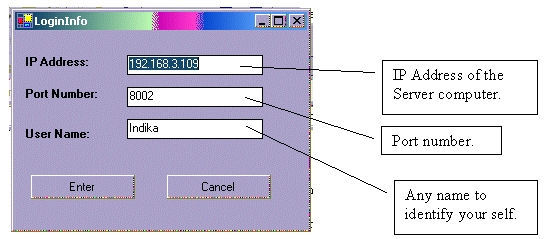

- #Multithreading vb net 2010 example how to#
- #Multithreading vb net 2010 example install#
- #Multithreading vb net 2010 example code#
- #Multithreading vb net 2010 example password#
Public Event ScanDied(ByVal p_strFolderID As String, ByVal p_strError As String)
#Multithreading vb net 2010 example code#
So the relevant code for the collection class: like I said before, except that when the callback executes, it is doing so, on the callback thread, not the main thread. So, In practice, it seems to work alright. The delegate subs also funnel all the callbacks from the multiple classes into a single return callback. Since I wanted to have multiple monitoring, I created a collection class and put my callback delegate subs there, as this collection class is instantiated on the main thread. The thread's only job is to take the contextual information given during the init, and provide notifications as to the arrival of new items. To give you some context as to the specific issue, I have a pair of classes that allow my to dynamically monitor a folder and notify the main app if a new item appears in it. which explains why my code is blowing up. I thought that using async callbacks implied that the main thread would actually execute the callback event, but according to my thread viewer, the callback is still on the other thread.
#Multithreading vb net 2010 example install#
Poltak Jefferson on Install FreeRadius with Web Ba…
#Multithreading vb net 2010 example how to#
Jose Luis Herrera on How to Block Bittorrent and P2…
#Multithreading vb net 2010 example password#

Me.BeginInvoke(New InvokeWriteLabel1(AddressOf WriteLabel2), i2) Me.BeginInvoke(New InvokeWriteLabel1(AddressOf WriteLabel1), i1) Private Sub WriteLabel2(ByVal x As Integer) Private Sub WriteLabel1(ByVal x As Integer) Private Delegate Sub InvokeWriteLabel2(ByVal x As Integer) Private Delegate Sub InvokeWriteLabel1(ByVal x As Integer) Here is a simple code to show how multithread works. Multiple threads can greatly improve performance when executing time-intensive tasks such as file input and output. The operating system allocates processing time for each thread based on factors such as the thread’s priority and how much time has passed since the thread last ran. A thread can represent an entire application, but more often it represents just one part of an application that can run separately. Although most personal computers only have a single processor, modern operating systems provide multitasking by dividing processor time between multiple pieces of executable code called threads.

Multithreaded programs are possible because of an operating system feature called multitasking that simulates the ability to run multiple applications at the same time.


 0 kommentar(er)
0 kommentar(er)
